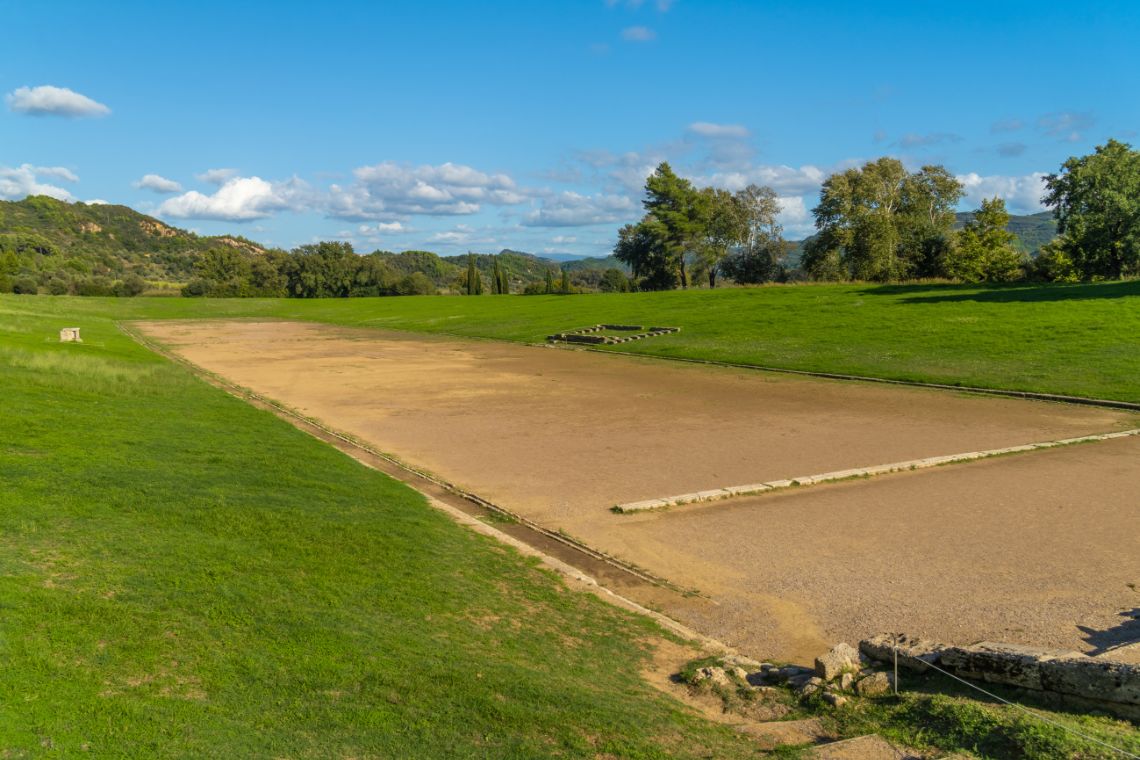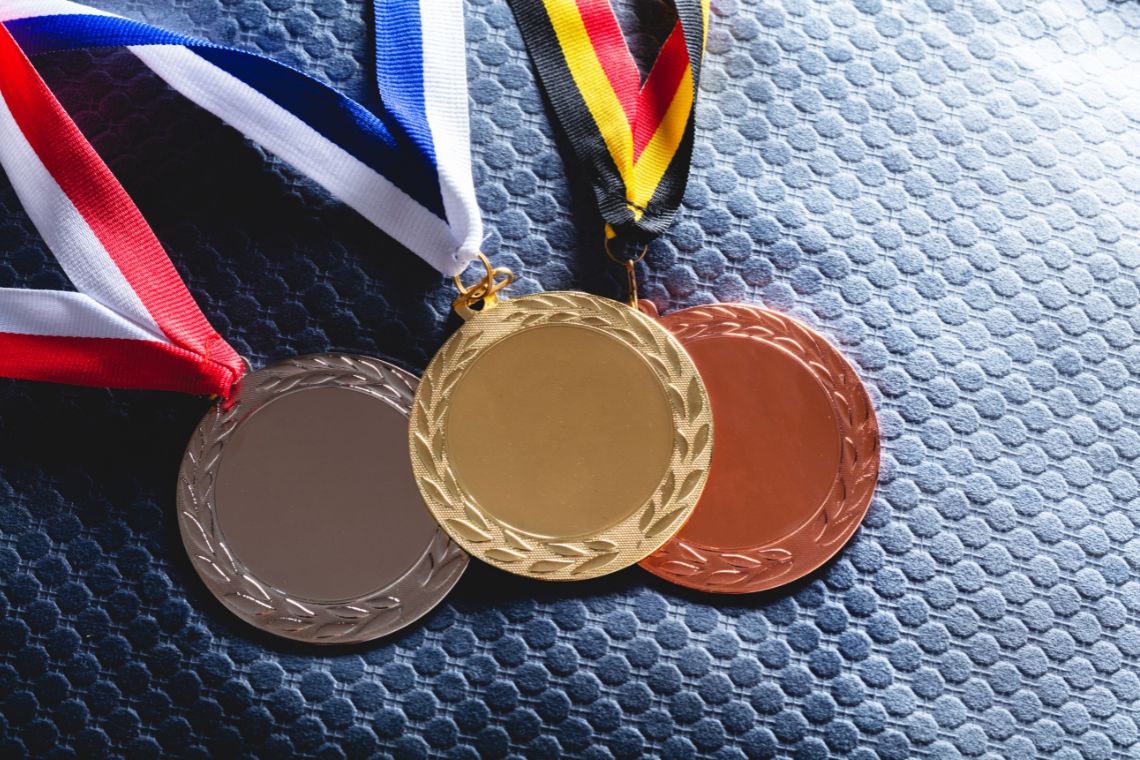The Olympic Games have long been regarded as the best of international sporting competitions. With roots dating back to ancient Greece, these events still bring together the best athletes to compete. Throughout their history, the games have naturally evolved and expanded to become not only a celebration of sportsmanship, but also a cultural phenomenon that crosses borders and unites people.
Originally, the Olympic Games took place in ancient Greece to honor the Greek gods, especially Zeus. Over time, the importance of the games grew and they became an important cultural event for the Greeks.
In modern times, the International Olympic Committee has worked diligently to preserve the legacy of these ancient games while adapting them to a modern audience and expanding their international reach.
In this article, we will not only explore the origins of the Olympic Games in ancient Greece, but also analyze their timeline and focus on their “resurrection” in modern times. So if you are a fan of this world-famous sporting event, do not miss this read!
Key Takeaways
- The Olympic Games began in Ancient Greece to honor the gods, with Olympia serving as the birthplace.
- In modern times, the competition has evolved from being a solely Greek cultural event to an international sports gathering.
- Visiting Olympia today offers an opportunity to understand the origins and legacy of this enduring sporting tradition.
The Birthplace of the Olympic Games: Olympia, Greece

Ancient Olympia, Greece - Credits: Georgios Kritsotakis/ Shutterstock
Description of Ancient Olympia as the Heart of the Games
Ancient Olympia, located in the western Peloponnese region of Greece, holds significant historical, cultural, and athletic importance. As the home to the first Olympic Games, which began in 776 BCE, this site became a prominent gathering place for athletes, spectators, and religious figures from across the ancient Greek world.
Geographical and Cultural Significance of Olympia
Olympia's location in Greece contributed to its cultural significance. Its natural landscape, surrounded by hills, and the Alpheios River provided a picturesque setting for the games, while its remoteness ensured that only dedicated individuals made the journey. In addition, Olympia was a key center for commerce, attracting traders and merchants, further solidifying its role in the cultural life of ancient Greece.
The Religious Connection to the Games and the Worship of Zeus
The Olympic Games were closely connected to the worship of Zeus, the supreme god of the ancient Greek pantheon. In fact, the games were part of a religious festival honoring Zeus. The site of Olympia hosted magnificent temples and statues dedicated to Zeus, including the famous Statue of Zeus, one of the Seven Wonders of the Ancient World. It is worth noting that the games' religious association played a crucial role in connecting Greek city-states and promoting a sense of unity among them.
When Was the First Olympic Games: Tracing the Timeline
The Ancient Timeline: From 776 BC to 393 AD

Olympic Stadium in the archeological site of Olympia - Credits: Leamus/ Canva
The first recorded Olympic Games took place in 776 BC in Ancient Olympia. One of the most iconic winners in this period was a cook named Coroebus, who won the only event, a 192-meter foot race called the stade. The ancient Olympic Games continued for 12 centuries until 393 AD when they were eventually abolished.
Here is a brief timeline of key events during the Ancient Olympic Games period:
- 776 BC: First Olympic Games.
- 472 BC: Introduction of the hippodrome for equestrian events.
- 520 BC: Conclusion of the long jump, discus throw, and shot put events.
- 408 BC: Establishment of the Panhellenic Games, including the Pythian, Nemean, and Isthmian games.
- 393 AD: Abolition of the Olympic Games by Emperor Theodosius I.
The Historical Context of the Ancient Games
The ancient Olympic Games were deeply rooted in Greek religious traditions, honoring the god Zeus. A truce was upheld by all warring states during the ancient Games, a tradition still observed in the modern Olympics through the Olympic Truce.
The Cessation and Revival of the Olympic Games
The Olympic Games were abolished by Emperor Theodosius I in 393 AD as part of his efforts to suppress paganism in favor of Christianity. They remained dormant for more than 1,500 years until their revival in the modern era. The Athens 1896 Olympic Games marked the beginning of the modern Olympic movement, which was championed by Frenchman Pierre de Coubertin. Taking place from April 6 to April 15, 1896, these Games brought athletes from 14 countries together to compete in 43 events across 9 sports.
5-Day Percy Jackson Mythology Trip
The Ancient Olympic Games: A Cultural Phenomenon
The Ancient Olympic Games featured a variety of sports and events. These events included running, jumping, throwing, boxing, wrestling, pankration, and chariot racing. At its peak in the second century AD, the games attracted around 40,000 spectators daily. There were also other sporting festivals held in Greece, such as the Pythian Games at Delphi, the Nemean Games at Nemea, and the Isthmian Games near Corinth.
Some notable events were:
- Running: There were multiple types of races, with various distances and age categories.
- Jumping: The long jump required athletes to use handheld weights (called halteres) in an attempt to increase their jumping distance.
- Throwing: Discus and javelin throw were popular events at the ancient Games.
- Combat sports: Boxing, wrestling, and pankration (a martial art combining wrestling and boxing) showcased the physical prowess of the athletes.
The Role of the Olympic Games in Greek Civilization
The ancient Greek civilization considered the Olympic Games to be an essential part of their culture and tradition. The Games were an opportunity for citizens to showcase their athletic abilities and compete for glory. Furthermore, during the Games, a temporary truce called "Ekecheiria" was declared, allowing athletes to travel safely to Olympia and promoting peace among the city-states.
The Olympic Games were a venue for politics, diplomacy, and cultural exchange. Athletes were considered heroes and role models, influencing society and inspiring future generations. The Games also allowed cities to display their strength and wealth, as winning athletes brought prestige to their home city.
Accordingly, the ancient Olympic Games have had a lasting impact on modern sports, shaping the organization and spirit of the current Olympic Games. While many of the ancient events have evolved, some, such as running races, long jump, and discus throw, remain part of the modern Olympic sports lineup. Moreover, the ideals of sportsmanship, fair competition, and peaceful international relations have their roots in the ancient Olympic Games.
The Revival of the Olympic Games: From Ancient to Modern

Gold, Silver and Bronze Medal on Velvet Cushion - Credits: Photocreo/ Canva
In April 1896, a reimagined Olympic Games event took place in Athens where participants from 14 countries gathered to compete in a festival that was both ancient and modern. Coubertin, the visionary founder of the modern Olympic Games, devoted his life to education, history, and sociology. He became inspired by the ancient Olympic Games and set out on a mission to create a new global sporting event. In 1894, he founded the International Olympic Committee (IOC) to organize and promote the modern Olympic Games.
The modern Olympic Games have since evolved and expanded to include both Summer and Winter Games, featuring athletes from all over the world. Athlete participation has also changed significantly, with women now playing an integral role in the competition. Olympians compete in various sports, such as swimming, skiing, figure skating, weightlifting, and many others.
The International Olympic Committee (IOC) oversees the organization and coordination of the games, ensuring that the event adheres to the Olympic Charter, which has continued to evolve as the Olympic Games grow and adapt.
The Legacy of the Ancient Games in Modern Times
The modern Olympic Games owe much to the ancient Olympic Games of Olympia, Greece. Both events emphasize the importance of athletics and international camaraderie in their respective time periods. The revival of the Games also reflects the cultural impact of ancient Greece on modern societies.
The spirit of the ancient Olympic Games lives on in various aspects of the modern Games, from the time-honored tradition of lighting the Olympic flame to the display of qualities representing the true nature of sportsmanship, including mutual respect, friendship, and perseverance.
Visiting the Birthplace of Olympic Games: What You Need to Know
As a tourist destination, Olympia offers a unique blend of history and natural beauty for sports enthusiasts and history lovers alike. Modern-day Olympia provides visitors with various attractions and activities that celebrate the legacy of the Olympic Games.
When in Olympia, there are several sites and museums that are linked to the history of the Olympic Games. The Archaeological Site of Olympia is home to the ruins of ancient structures, where the games were held from 776 BC to 393 AD.
A visit to the Archaeological Museum of Olympia is an opportunity to learn more about the games and their significance in ancient Greek society.
Olympia Travel Tips for History and Sports Enthusiasts
- When planning your trip, consider visiting Olympia during the off-peak season to avoid large tourist crowds.
- Allocate enough time to explore the archaeological site, as there is a lot to see and learn.
- Enhance your experience by learning about the Olympian gods and their symbols before your visit.
- Don't forget to wear comfortable shoes and bring sunscreen, a hat, and water for your day of exploration.
- Lastly, be respectful of the ancient site and its surrounding environment. Preserve this historical treasure for generations to come.
By following these tips and immersing yourself in the rich history of the Olympic Games, your visit to Olympia will surely be an unforgettable experience.
From Nafplio: Percy Jackson Olympia Tour
Conclusion
Initially, the Olympic Games were centered around religious gatherings and dedicated to the Olympian gods. Over time, the purpose of the games transformed, and today, they are a global event that brings together athletes from around the world to compete in various sports.
Still, while the Olympics have certainly undergone countless changes over the years, they continue to embrace the true spirit of athleticism.
For this reason, the future of the Olympic Games looks promising, with increased focus on sustainability, technological advancements, and ongoing efforts to make the games more accessible and diverse.
In summary, the Olympic Games are an integral part of global sports culture, showcasing the incredible achievements of athletes from various backgrounds and inspiring generations to come.
FAQs
What events are included in the Summer Olympic Games?
The Summer Olympic Games consist of a wide range of sports, including athletics (track and field), swimming, gymnastics, cycling, and team sports like basketball and soccer. There are currently 33 sports represented in the Summer Olympics, with each sport having multiple events and disciplines.
How has the history of the Olympic Games evolved to its current form?
The Olympic Games originated in ancient Greece more than 2,000 years ago and were revived in the late 19th century by Pierre de Coubertin. The first modern Olympics took place in Athens in 1896. Over the years, the structure and organization of the Games have evolved, adapting to changes in the world.
How does hosting the Olympic Games impact a city in modern times?
Hosting the Olympic Games can have both positive and negative impacts on a city. It often provides short-term economic benefits by attracting tourists and investments. It also promotes infrastructure development, creating lasting legacies like sports facilities and transportation improvements. However, the high costs and resource requirements can sometimes outweigh the benefits, leading to financial strains, environmental concerns, and issues with displacement of local populations.
What is the difference between the Summer and Winter Olympic Games?
The main difference between the Summer and Winter Olympic Games lies in the sports they include. Summer Olympics focus on warm-weather sports like swimming, track and field, and team sports, while the Winter Olympics feature cold-weather sports such as skiing, snowboarding, and ice skating.


